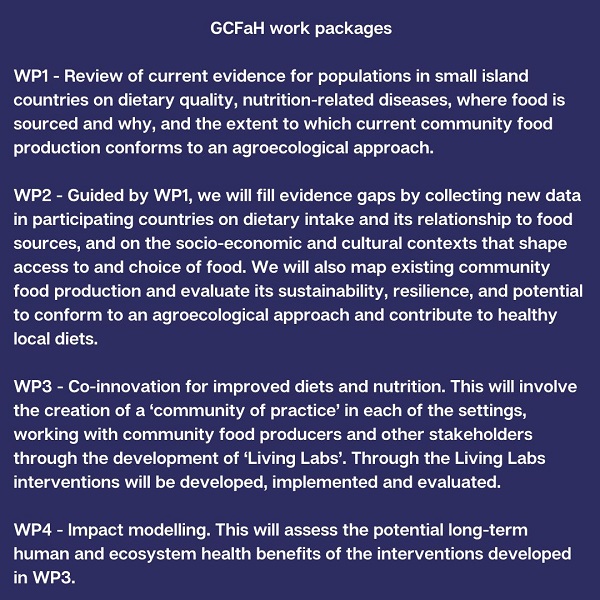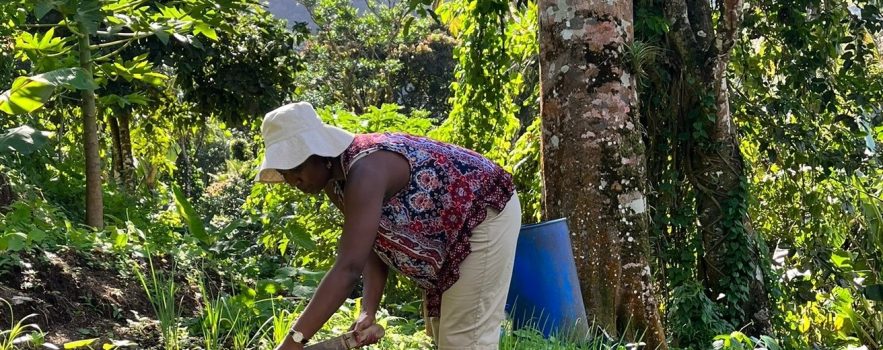MRC Epidemiology Unit researchers are participating in a new National Institute for Health and Care Research (NIHR) project that is investing £2.9 million into new research in the Caribbean, Pacific and Philippines that aims to improve population nutrition through ecologically sustainable local food production. The NIHR Global Health Research Group on Community Food for Human Nutrition and Planetary Health in Small Islands (GCFaH) will provide new evidence on the burdens of diet related diseases, such as type 2 diabetes, and on food production practices. It will work with local food producers and retailers, and with local communities, to co-design and evaluate interventions for better population nutrition. The interventions will be designed to be economically, socially and ecologically sustainable.
Professor Nigel Unwin, Project Co-Lead at University of Exeter, and Director of Research in Global Public Health Research at the MRC Epidemiology Unit, said:
In small island countries of the Caribbean, South East Asia and the Pacific, around two thirds of the food consumed is imported. Most of the imported food is of low nutritional value. At the same time, local food production has been steadily declining, made worse by extreme weather events associated with climate change. All of these countries have high burdens of nutrition related ill-health, including non-communicable diseases associated with overweight and obesity and deficiencies of some micronutrients, especially iron. This project aims to provide evidence on how to improve human and ecosystem health for better nutrition.”
Who is involved and where?
GCFaH builds on several years of collaboration between universities and civil society organisations in the global south and north. It is co-led by the University of Exeter in the UK and the University of the West Indies in Barbados, with the University of Cambridge and academic and civil society partners in Fiji, the Caribbean, and Philippines. The project brings together experts from a broad range of disciplines, including in agriculture, fisheries, economics, social sciences, epidemiology, public health, nutrition, and chronic non-communicable diseases.
What is being done?
Globally, the way that food is currently produced is unsustainable, being a major contributor to climate change and to biodiversity loss. In addition, burdens of nutrition related diseases are high in all regions of the world, and especially in small island states. Together the partners in this new research project aim to help provide solutions that will both improve population health and nutrition and ecological sustainability.
The project will work in island countries and settings in the Caribbean, Pacific and Philippines to provide evidence on how to improve human and ecosystem health for better nutrition. The work will be guided by the UN Food and Agriculture Organization’s 10 elements of agroecology. Researchers will work with local communities to assess their needs and develop ‘living labs’ to work together to increase local food production and improve household nutrition. The project will inform national and regional policy goals of developing sustainable and healthy food systems. The project is organised into four work packages (WP), which are summarised below.

Community engagement and involvement
Community members and organisations will be involved throughout the project, which will learn from their experiences, traditions and knowledge, and respond to their needs. Networks of local stakeholders will also be involved for expert consultation, including policymakers, food producers and other actors across the food value chain.
Dr Madhuvanti Murphy, Project Co-Lead at University of the West Indies, commented:
The beauty of this project is that it is itself an ecosystem. We have stakeholders across a wide variety of disciplines and from different levels of the food system coming together to co-design community interventions for food production that we hope will improve diet diversity and nutrition security, while being good to and for the planet. Given the many similarities across our small island states, there is opportunity for transferability and scaling up of successful interventions. We also hope that evidence from our work will be utilized by policy makers, and that policies related to areas such as health or agriculture will as well take a multi-disciplinary approach.”
Improving food systems and diets
GCFaH will enhance learning and collaboration across academic institutions, and between researchers and local NGOs working with small food producers in participating communities. It will provide policymakers with well-defined and evaluated interventions designed to improve household nutrition. For continued use beyond the project, a website will host materials, including case studies and guidance based on lessons learned for improving local food systems and diets using an agroecological approach
Professor Nita Forouhi of the MRC Epidemiology Unit said:
This project will enable joining the dots across diverse factors that have typically been researched in silos or extrapolated from other countries. By studying dietary intakes, their sources and contexts that shape food choice, this project will provide the knowledge needed to design relevant public health interventions specific to small island communities. Building this research evidence is exciting and timely.”
Since the project began in August 2022 members of the project team have travelled to the intervention sites in each country to meet with national policy makers, local Non-Governmental Organisations and communities where the work will take place.
The NIHR is funded by the Department of Health and Social Care. Its work in low and middle income countries (LMICs) is principally funded through UK Aid from the UK Government.

 MRC Epidemiology Unit
MRC Epidemiology Unit